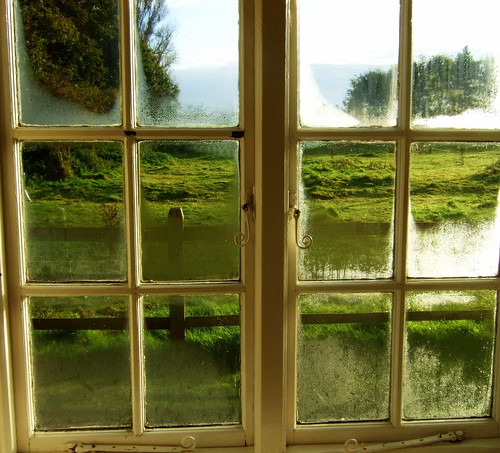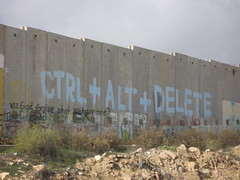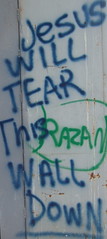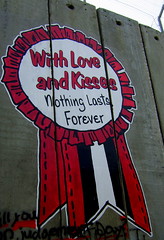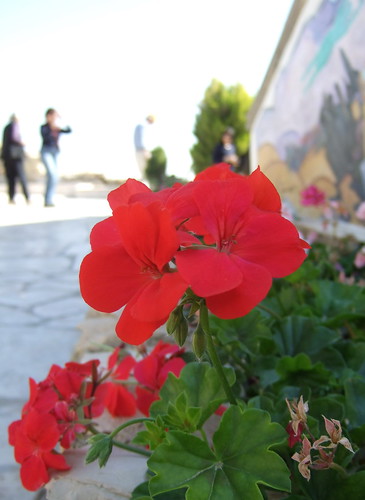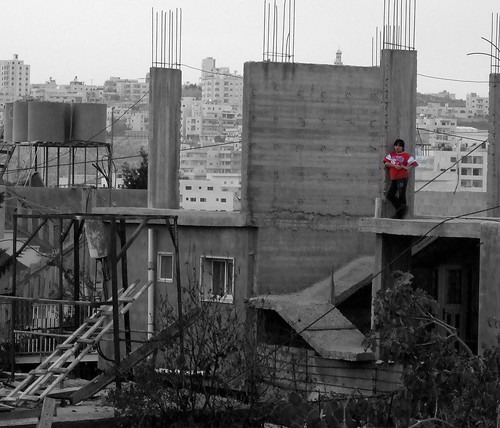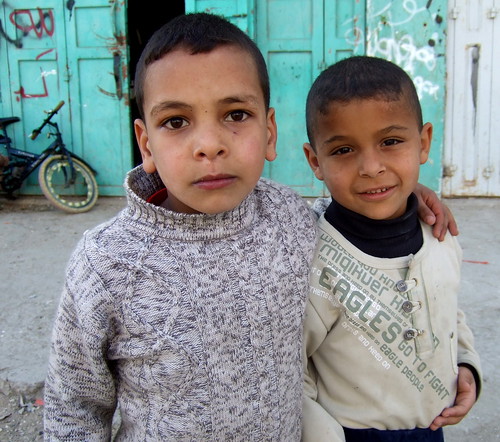Monday, 29 December 2008
Crisis in Gaza
It was only last month that I was standing on the border of the Gaza strip looking out at the Gaza city skyline while the sun shone down on the Mediterranean sea.
I can remember the moment we sat with Israeli's in a Jewish kibbutz in Sderot. As we arrived, our host told us that if we hear a siren with the words "COLOUR RED", we had about 40 seconds to rush to the bomb shelter. I later found out that it was nearer 15 seconds and the announcement is in Hebrew. Sderot has been one of the main targets of Qassam rocket attacks from Gaza.
Whilst we listened to their stories of community life, less than a mile from the Gaza border, we heard a loud rushing noise as an F16 fighter plane flew directly overhead. Our speaker stopped talking and the whole room fell silent. During our time at the kibbutz we heard several other jets flying overhead. Our Jewish friends told us that this activity from the Israeli Air Force was not normal. At the time we discussed whether these were intimidation tactics by the Israeli Defense Force towards the Gazans but in hindsight it seems that they may have been preparing for the recent attacks.
When asked whether they felt protected by their government, the Israelis said "No" and furthermore that the Israeli government needed holding to account by the US and international community.
The ongoing rocket attacks from Hamas have been used to justify the latest military campaign. The Israeli Defence Minister Ehud Barak has said that the aim of the strikes is to "stop rockets and missiles being launched on Israel". However it is already clear that the recent attacks on Gaza will not only strengthen the resolve of Hamas to destroy Israel it will serve to increase the bombardment of rockets into Israel. There has even been talk of Hamas resuming the campaign of suicide bombing.
Our Israeli friends are now undoubtedly less safe as a result of the recent Israeli military campaign. I only hope and pray that as Israel prepares the next stage of the attacks it doesn't seek to recapture the Gaza strip or indeed trigger a third Intifada.
Please sign the petition calling for an immediate ceasefire in Gaza or follow the other actions on Rachel's blog post.
Gaza
 I have been horrified to witness the unravelling of the situation in the Gaza Strip over the last two days. 300 hundred people are dead. Israel is bombing an enclosed territory of 1.5million people, many of whom are refugees.
I have been horrified to witness the unravelling of the situation in the Gaza Strip over the last two days. 300 hundred people are dead. Israel is bombing an enclosed territory of 1.5million people, many of whom are refugees.Please take action by:
- Writing to your MP through www.writetothem.com asking the UK government to put pressure on Israel and Hamas to stop the violence.
- Visit http://www.avaaz.org/en/gaza_time_for_peace/?cl=161620838&v=2605 and sign the petition calling for an immediate ceasefire in Gaza.
- Attend a demonstration - some information here
- Boycott Israeli goods, and tell them you are doing so by writing to the Israeli ambassador:
2 Palace Green
London
W8 4QB
Tuesday, 16 December 2008
A hope for Christmas
This time of year is miserable: the freezing weather is a sever health hazard for many homeless people, and a couple of years ago a homeless man in my parents home town froze to death in a park, after sleeping there all night. Death is a daily reality for many of them during this time of year. When working at Leamington Christian Mission, a soup kitchen for the homeless, I heard about how some would commit crimes over the winter in the hope of being caught: so they could get a hot meal and roof over the head; even if it was just for one night.
When I arrived at work after making myself a hot drink and starting to defrost from my ride, I sat down to read my emails and came across the Women’s Organisation for Political Prisoners, about many (mostly) Palestinian women who are being held in Israeli jail and the treatment they receive, which by all accounts is horrendous.
Over the last few weeks I have also been hearing about the plight of the Shministim, young Israelis who are refusing to serve in the Israeli Defence Forces, many of whom have been sent to prison because of their conscientious objection. These teenagers – yes, teenagers – are showing immense courage against a huge amount of opposition, including much from their friends and family, as well as the authorities. One of the Shministim, Yuval Oron-Ofir, yesterday was sentenced to this third term for refusing to serve.
This takes me back to a conversation we had while staying at Dheisheh Refugee Camp where our guide, who will remain anonymous as it is illegal for him to talk to us, described how the community there worked together to look after its members. He mentioned how there were no homeless people in the camp, as people would always provide for them to make sure they had a roof over their head. In a place like Palestine where people have so little but give so much, it shames me to think of the huge number of homeless people that we fail to provide for across Oxford, and the UK.
I hope this Christmas we can all keep those who are not as fortunate as us in our hearts and minds: whether they are in England or elsewhere in the world.
Monday, 8 December 2008
 The destruction of olive trees
The destruction of olive trees “One of the collective punishments which not only harm us economically but also and above all strike at our symbols is the destructive on olive trees. This crime against nature wounds our very soul. The sight of destroyed olive groves is incredibly painful.
 Sometimes the trees are just mangled or topped, the explanation being that the security of the settlers requires it – the security of settlers in settlements which have been built illegally on Palestinian land. This hostile act is often also carried out as a punishment. If a boy standing in a field which does not belong to him throws a stone, the owners of the field lose their trees.”
Sometimes the trees are just mangled or topped, the explanation being that the security of the settlers requires it – the security of settlers in settlements which have been built illegally on Palestinian land. This hostile act is often also carried out as a punishment. If a boy standing in a field which does not belong to him throws a stone, the owners of the field lose their trees.”Wednesday, 3 December 2008
Handala: The Refugee Child

Art is the ultimate defiance of violence. To respond by being creative when faced with violence is to refuse to meet violence on its own terms.
Violence occurs only when creative thinking is exhausted. Creativity, on the other hand, denies violence its power, dismantles its preconceptions, and defeats its aims.
Visiting the West Bank I was struck by the abundance of creativity. Graffiti on the separation wall is purposeful and often beautiful, a stark contrast to the mindless scrawls that adorn railway bridges across the UK.
A house in the Jerusalem suburb of Anata demolished four times by Israeli bulldozers has each time been rebuilt, colourfully repainted and its restful garden lovingly restored. The family who own the house can no longer face the emotional trauma of living there (a fifth demolition order has been placed on the house), so it has been instated as a peace centre, and serves as a hub of peace education for Palestinians and people visiting Palestine.
At a farm where they cannot get a permit to build on their own land, they build under the land instead, constructing living quarters, workshop rooms, and offices in underground caves.

One creative symbol in particular has become the life blood of Palestinians. The Handala - a cartoon Palestinian refugee child - is seen all around Palestine, etched on university lockers, painted on the walls of homes in refugee camps. The Handala has come to represent the plight of the 7 million Palestinian refugees around the world, their search for justice, and their longing to return home.

Handala's original creator, Palestinian cartoonist, Naji Al-Ali, wrote:
"The child Handala is my signature, everyone asks me about him wherever I go. I gave birth to this child in the Gulf and I presented him to the people. His name is Handala and he has promised the people that he will remain true to himself. I drew him as a child who is not beautiful; his hair is like the hair of a hedgehog who uses his thorns as a weapon. Handala is not a fat, happy, relaxed, or pampered child. He is barefooted like the refugee camp children, and he is an icon that protects me from making mistakes. Even though he is rough, he smells of amber. His hands are clasped behind his back as a sign of rejection at a time when solutions are presented to us the American way.In 1987 Naji Al-Ali was assassinated in London, outside the office of the Kuwaiti newspaper for which he drew political cartoons. He was 50 years old.
"Handala was born ten years old, and he will always be ten years old. At that age, I left my homeland, and when he returns, Handala will still be ten, and then he will start growing up. The laws of nature do not apply to him. He is unique. Things will become normal again when the homeland returns.
"I presented him to the poor and named him Handala as a symbol of bitterness. At first, he was a Palestinian child, but his consciousness developed to have a national and then a global and human horizon. He is a simple yet tough child, and this is why people adopted him and felt that he represents their consciousness."
Monday, 1 December 2008
An Angel Sighting in Beit Sahour
We talked until late. Jane, whose English was very good, spoke about her life in Beit Sahour. She has four sisters who are now all married, two living in Jordan. She showed us the photographs of the weddings - for the most recent she was the bridesmaid - and the pictures of her neices and nephews.
Jane works at the Applied Research Institute, Jerusalem (ARIJ) which is an environmental research institute and particularly looks at the environmental cost of the occupation. We visited ARIJ the following day - and they have such a wealth of information - their maps are particularly useful for understanding the occupation.
A message that came across very clearly from Jane, and from other young Palestinians we had the privilege to meet, was the message 'we are tired'. 'Talk about our feelings' we were told. 'Make people see us as humans'.
I wish I had the words.
When I asked about angel-sightings in the neighbourhood, unfortunately our hosts had not seen any, but they told us a local legend of cursed gold hidden in the caves which Jane and her sisters used to play in as children. This gold, we were told, accounted for the few rich, crazy people in the locality.
Friday, 28 November 2008
Processing Time
A number of emails I received during the delegation are helping me through this – reminding me of what we did, who we met and organisations whose work I want to keep up with. At the moment these seem insurmountable. However, as I slowly start to sort my way through them, a link sent to me by someone we met stands out: http://www.youtube.com/watch?v=zSlQ98r5QXo .
The link takes you to a film made by an ex-IDF solider who was asked to make a film about his experiences. It is truly mind-blowing and creates more questions, than answers. I am starkly aware that nothing we saw was as bad as described on the video. However I was very aware of the harsh reality during the delegation, and even more so now. I hope some of you will take the 25 minutes to watch this video. It really is worth every second.
Tuesday, 25 November 2008
Military Occupation Invades the Hearts of Children
Palestinian peacemaker Zoughbi Zoughbi says the Israeli occupation of the West Bank and Gaza is not only physical, but psychological. Gun wielding soldiers, dividing walls, and checkpoints not only adorn the physical landscape - they adorn the emotional landscape within people's soul. Trauma is endemic.
To illustrate his point, Zoughbi tells the true story of a young Palestinian child.
Midnight is just past, winter rain patters on the windows. The child cannot sleep. He wanders through to his parents' bedroom, wakes them up.
'Mum! Dad! Where are my marbles?'
They are confused, annoyed at being woken up. The haze of sleep still lingers on their eyes.
His father speaks. 'Why do you want your marbles? It's late, dark and raining outside. You'd have nowhere to play. Go back to sleep and we'll find them in the morning.'
'I want them now,' the child replies. He is insistent. Fully awake now, and seeing that their child is distressed, the parents get up, find some marbles in corners and hidey holes around the house.
'Here,' they say. 'Your marbles.' They expect a smile, a thank you.
'Put them in the toilet?,' the child says.
Confusion again. What game is this silly child playing? He is almost in tears. 'Is everything okay?,' the mother asks.
The child confesses his fears.
Earlier that week the child had been playing on the street. His friend across the street was playing marbles. Soldiers came and accused his friend of firing the marbles at them from a slingshot. His friend's older brothers were arrested, put in jail. His parent's house was demolished by Israeli bulldozers. All because of playing marbles in the street.
'Mum, Dad,' the child says, 'I'm scared. I love you. I don't want this to happen to us.'
They calm their child down, put him to bed, assure him that it won't happen to them. In the morning, he decides to keep his marbles.
Deep down, the parents can never know. They abide by the rules of the occupation, are careful not to upset soldiers, believe they are cautious enough to have stayed off the Israeli blacklist.
Yet always the fear, the unknowing, the sense of powerlessness. And now - to their horror - it has invaded their children.
Monday, 24 November 2008
Yad Vashem - Sunday 16th Nov '08
 Yad Vashem - the holocaust museum is superbly assembled. So much information is clearly presented, balancing facts with emotive responses and the reminiscences of eye-witnesses.
Yad Vashem - the holocaust museum is superbly assembled. So much information is clearly presented, balancing facts with emotive responses and the reminiscences of eye-witnesses.In the final room, a circular room, there are the faces of Jews killed in the holocaust. My question was Where is my photo? Where is the picture of the person who could be me? Who looks like my mother? My grandmother? The photos were there.
Someone said to us 'the Israelis and the Palestinians are competing for victimhood'. But it strikes me that we all have the potential to be victims, but equally, all of us have the capacity for violence, to be the perpetrator.
This was made abundantly clear from the view at the exit of the museum - a fine view of a green valley with a town on the hillside. This town used to be Deir Yassin, a Palestinian village evacuated in 1948 and the scene of a massacre of over a hundred men, women and children, perpetrated by a fledgeling Israeli army.
Monday, 17 November 2008
New Profile
Consigning to the Israeli army is part of the education system. We heard about a school trip to the Golan Heights to watch tanks do target practice. From the age of 12, children are encouraged to begin to think about their involvement in the army and what part they might play. Every young person is issued with a military number. The military provide no information for young adults who do not wish to sign up and make the process of refusing conscription very difficult. For some they are the sole bread-winner; a below minimum wage of $100 per month is just not enough (and non-uniformed officers get paid less). Most soldiers are supported by their families. We heard about a young man who took up his right as a refuser at the age of 16. His case took 6 years to go through the tribunal.
'New Profile' work to provide information and support for young people and parents about their rights to refusal. This includes legal aid teams that work with young people to give them legal advice and representation, a parents support group and a youth group and summer camp to give space for young people to ask important questions about. Every military personnel has a profile number, ranging from 21 to 97. 'New profile' propose that non-military persons and refusers should have a new profile and their contribution to society should not be measured only by their involvement in the army.
Some other points of interest. We learnt that the largest industry in Israel is the arms trade; they are the fourth largest supplier of weapons in the world. Their second largest industry is diamonds. It is believed that many of these are conflict diamonds.
My feeling is that the presence of organisations like 'New Profile' are very important in the current climate of a militarized society. I don't know that there is anyone else asking the questions that they're asking. No society should get used to seeing armed soldiers on public transport and on every street corner.
Sunday, 16 November 2008
Talking Peaces by Martha
One of the reasons why I have been so enthusiastic to take part in the delegation has been the variety of people, places and experiences which it introduces us to. As each day progresses I realize that everyone connected to Israel and Palestine has their own story to tell and view of the situation. I have had to reframe my thinking from a conflict of two sides, to a conflict of many sides and stories - more than I could have possibly imagined. And it feels like quite a responsibility to record them and think about how I can convey them once I get home to everyone who is interested in our work and supported me during this journey.
On Thursday we visited an urban Kibbutz in Sderot, just north of the Gaza Strip. You will probably recognize the name as Sderot is an area which often receives Kasam rockets from the Gaza Strip. This week, in response to the rocket attacks, Israel sent in troops and killed four combatants. During our visit we met Eric Yellin, a member of the Kibbutz and a founding member of a local group called ‘Other Voice’ which tries to bring out another voice in their community through trust building processes and building relationships with people on the other side of the Erez check-point, in the Gaza Strip. Part of the work, as Eric described it, is creating a place where people don’t feel alone – both in Sderot and Gaza and creating what he described as “small peaces” (which I assume was a deliberate play on words by Eric).
 On Friday we drove up to Jenin and stayed with local olive tree farmers for the night. Our host family were welcoming and keen to talk to us about why we were here and what we were doing. Our hosts had 12 children – 9 daughters and 3 sons, and their oldest son, his wife and 10-month old son also lived in the family home. This family live 800 meters from the wall, which has not only carved up their village but also their land. They described how before the wall they used to visit friends in the nearest Israeli village – 5 minutes drive away. But since the wall they would have to drive via Jerusalem – which would take about 5 hours. They no longer
On Friday we drove up to Jenin and stayed with local olive tree farmers for the night. Our host family were welcoming and keen to talk to us about why we were here and what we were doing. Our hosts had 12 children – 9 daughters and 3 sons, and their oldest son, his wife and 10-month old son also lived in the family home. This family live 800 meters from the wall, which has not only carved up their village but also their land. They described how before the wall they used to visit friends in the nearest Israeli village – 5 minutes drive away. But since the wall they would have to drive via Jerusalem – which would take about 5 hours. They no longer  have any contact with their friends in this village. On Saturday morning the father and son walked us down to their fields – two of which are on their side of the wall, and eight of which are on the other side, and no longer accessible to them. In broken English we heard from the son how for the last four or five years he does not come to their field – which is next to the wall – alone, as he is too afraid. If he goes near the wall Israeli Defense Forces (IDF) forces will come to talk - or to kill - him. I was starkly aware of how uncomfortable he was being there, and how he took us there, despite this.
have any contact with their friends in this village. On Saturday morning the father and son walked us down to their fields – two of which are on their side of the wall, and eight of which are on the other side, and no longer accessible to them. In broken English we heard from the son how for the last four or five years he does not come to their field – which is next to the wall – alone, as he is too afraid. If he goes near the wall Israeli Defense Forces (IDF) forces will come to talk - or to kill - him. I was starkly aware of how uncomfortable he was being there, and how he took us there, despite this.I am aware that the more information I have and more people I meet, the harder this conflict is to understand. People’s generosity in sharing their homes, lives and stories with us has been truly awe inspiring and I just hope can encapsulate some of their passion one I return home.
Wednesday, 12 November 2008
The People Who Speak in Poetry - by David
I felt at home in the university. The inside of the buildings felt similar to British Universities - long corridors kept cool by their marble floors, administration offices bustling with secretaries making phone calls, classrooms with the last lesson's diagram still on the blackboard.
Students here are committed. Many of the students live in Bethlehem - a 30 minute drive away. Yet the separation wall between the West Bank and Israel means students have to go the long way round, a journey that takes at least an hour. If students are stopped at one of the 93 checkpoints in the West Bank at the whim of a moody Israeli soldier, the journey can take 3-4 hours. One American professor at the university was forcibly held at a checkpoint for 3 hours whilst an Israeli soldier read the sports section of the newspaper that the professor was carrying.
Given the harassment and violation of dignity that Palestinians are subject to on a daily basis, it is an amazement that they are able to stand at all. Yet not only do they stand, but they stand tall, they stand on the shoulders of giants. According to UN statistics, Palestinians are the most educated people in the world.
Still, it is not easy for them to sustain this upright pose. Asked what hope she has for the future, the female student replied: "What future?"
Then, speaking in English, her second language, poetry flows from her lips. She speaks from her heart:
"I can't feel anything here. I can't give anything. I can't give feelings. We are dying everyday. We are dead. That's it."
Every paragraph she speaks is punctuated with "That's it". That's it, there's nothing more, we have searched so far for peace, how can we continue searching, where can we find hope for ourselves, let alone hope to share?
"It's like we are pushing a wall," she says. "Everyone is depressed. Everyone is down. How can we give?"
The administrator, though, speaks up to disagree. He has hope. It took him 11 years to complete his studies for an MA in sociology because of the difficulty of getting to university. Somehow, he still manages to believe that a better future is possible. Like the female student, he speaks in poetry:
"From my inside I find there is hope, because occupation can't stay for ever." He pauses a moment, allowing his words to permeate the room. "Occupation can't stay for ever. No way."
Where does he find this hope? It is found in the refusal of Palestinians to hate Jews. Israelis believe that Palestinians all completely hate Jewish people; the Israeli government has to preach this to sustain the state of Israel and the illegal occupation of Palestine. Despite having every reason to be bitter, the Palestinians:
"Are not against an kind of religion. We have our hands open for peace; for dignity."
Palestinians are dying inside with the pain of oppression, yet their hands are open for peace. What can I do to fill these open hands with the peace they so deserve?
Tuesday, 11 November 2008
Land of Layers
As we ascend into the more hilly region, what strikes me, as the light fades, is the strata of the landscape - the layers of sedimentary rock, groaning under millennia of pressure of stress, being pushed together and thrust upwards. They have not stopped moving, or being moved.
And then today, walking through the old city of Jerusalem, a city of layers, different quarters wrapped around each other, walls that go down, right down, but not down far enough, into history, storing people's grief, pain and joy in the way they are rubbed smooth, in the scraps of paper jammed into niches. New walls terminate ancestral highways, forcing a reshaping of movements. The pressure of space, confined space.
Sunday, 9 November 2008
In just a few hours...
My hope is that I will find hope, my fear is that I will find hopelessness. I expect to find both.
I have two inspirations/motivations (at least!) for this trip. One is the motto of a co-operative of Palestinian olive farmers who print on their bottles of olive oil 'resisting the occupation by insisting on life'. The second is Jesus, who insisted on life - who insisted on life so strongly that he overcame death.
I'm really hoping to have an inspiring and fun time, as well as testing my own strength. I hope to come back with some songs, and I hope to encounter joy, in even the most difficult situations.
Tuesday, 4 November 2008
Martha's Preparation and Training
 Over the last year and a half I have been working for Fellowship of Reconciliation (http://www.for.org.uk/) to coordinate this delegation. After many days/ weeks reading internet websites, planning meetings, phone calls with Interfaith Peace Builders, trustees meetings and papers, it is amazing that the time has come and we have less than a week before we leave!
Over the last year and a half I have been working for Fellowship of Reconciliation (http://www.for.org.uk/) to coordinate this delegation. After many days/ weeks reading internet websites, planning meetings, phone calls with Interfaith Peace Builders, trustees meetings and papers, it is amazing that the time has come and we have less than a week before we leave!As David described, I found the training weekend a wonderful experience and was very glad to bring the team together to focus on what we are doing and why. Sam’s knowledge of the area and history of the region were really helpful in getting us focused on what we wanted to achieve. And the weekend felt hugely affirming as the group came together as a team. I appreciated the opportunity to get to know everyone better, think about how we can support one another before, during and after the delegation, and how to deal with some of the challenges we may face - from keeping ourselves healthy during the delegation to going through check points.
I have been amazed by the huge number of useful resources we have been able to find – of many different types: histories, political analysis, films, Christian Aid reports, fiction and accounts of life on the ground. Many of these have been really excellent and it’s been great to receive personal recommendations as well as those from internet searches. I am currently reading ‘Daughter of the Olive Trees’ by Sumaya Farhat-Naser, a Palestinian woman who has worked in many different ways and with many different people for peace. It is a really interesting book and not at all hard to read – thank you Orla for sending it to me!
This morning I took some time to look over the materials we
 covered during the training weekend and it was really good to revisit Quick Decision Making, what is violence/ nonviolence and the other activities. I most of all appreciated the opportunity to think about my personal motivations for going and revisit the group agreement for the delegation. Reading through the notes from the weekend, my excitement about going grows and how much I’m looking forward to being part of the team.
covered during the training weekend and it was really good to revisit Quick Decision Making, what is violence/ nonviolence and the other activities. I most of all appreciated the opportunity to think about my personal motivations for going and revisit the group agreement for the delegation. Reading through the notes from the weekend, my excitement about going grows and how much I’m looking forward to being part of the team. Tuesday, 21 October 2008
David on Training to Find a Peaceful Place
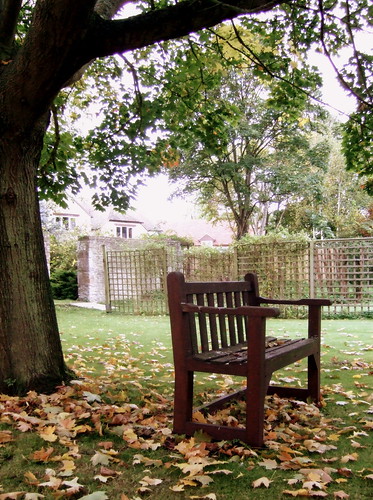
17th-19th October was the training weekend for the delegation at Charney Manor in Oxfordshire.
With the help of Sam Perlo-Freeman we learnt about cultural norms in Israel-Palestine, and received training in active nonviolence, conflict resolution skills and consensus decision making.
The training helped to put my mind at rest about the difficulties that we might encounter during the delegation.
I found the location of the training as important as the training itself in preparation for the trip. Being used to the hustle and bustle of city life in Manchester, it was restful to slow down and immerse myself in the countryside.
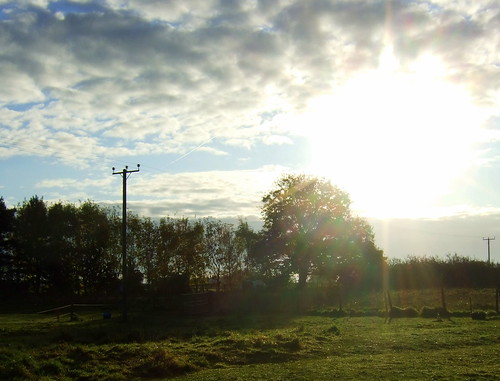
The freshness of the morning air, the nostalgia of staying in an old cottage, and the wildness of the crows clowning in the sky created a place of peace around me. Walking in the gardens before breakfast, I was able to pause and reflect, absorbing the peace of my surroundings into my being.

The peace-giving nature of the place and space around me gave me hope that I too can bring peace to places of conflict, hope to darkened lives, and mercy where injustice has prevailed.
